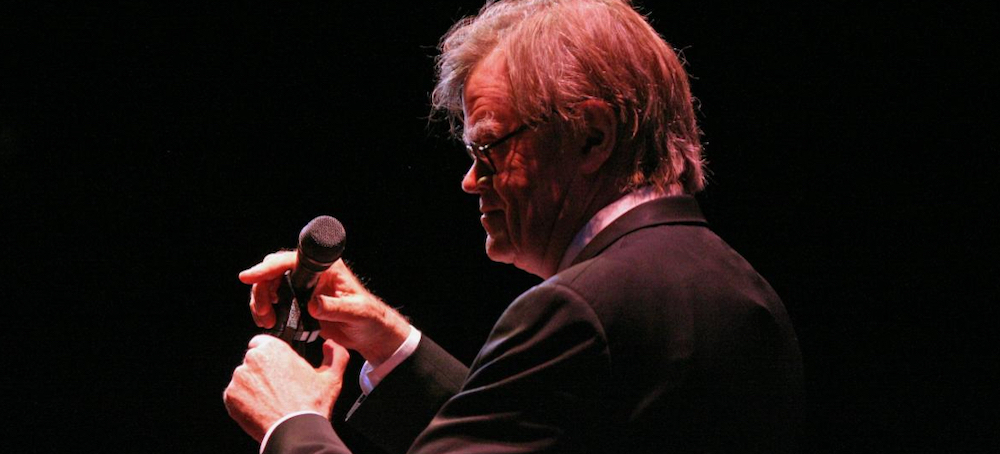Standing Up for the Age of 81
Garrison Keillor Garrison Keillor's Website Garrison Keillor. (photo: The Birchmere)
Garrison Keillor. (photo: The Birchmere)
A man of 81 has quite a bit to say. It’s too late to try to be hip; back in my twenties I was hip and wrote bad poems about the fascination of unreality, the beauty of cloudiness and mystery and longing for meaning that I thought were beautiful. Now I know that honesty and compassion and kindness are beautiful and there’s no mystery about that.
Some people get to the age of 78 without knowing this. Some people know it by 18 or 21. I was 40 when I quit smoking. I did it because smoking made me feel bad. This realization should’ve happened earlier. I quit drinking because early morning is my best time of day and hangovers are a knapsack of rocks I can well do without, but I was in my 50s when this dawned on me. Duh.
Octogenarians have less need to search for themselves; they can pay more attention to what’s around them. You stand at a lectern listening to a man of 78 at another lectern claim to be greater than Washington, Jefferson, or Lincoln, claiming that he won an election by a landslide though he got fewer votes — this is truly amazing. If you were 21, you might think, “Well, this is what politicians do.” When you’re 81, you know this is an absurdity and politicians mostly stay away from the absurd. They don’t campaign by yodeling while riding unicycles and carrying ferrets on their shoulders and wearing a cap with a revolving red light. They try to make sense.
Longevity is getting longer thanks to medical progress, more people hitting their nineties, which means that you can do dumb things well into your seventies and still have time to recover. Donald Trump could still become a decent modest human being and learn to tell a joke. I truly believe this.
I live on the Upper West Side of Manhattan, a good neighborhood for an old man. Everything is within walking distance: the drugstore, grocery, the dental hygienist. It’s ten blocks to church, which is long enough to think about what needs to change in my life. When I walk in, I feel welcome. Standing on a corner, waiting for the light to change, I easily strike up small talk with the woman pushing the stroller next to me. Something as simple as “Beautiful day today.” She agrees. I like this ease of familiarity. I see progress all around me — the crackers aisle at Trader Joe’s has a hundred varieties whereas we used to have five: soda, graham, Cheez-Its, animal, and Goldfish. Dozens and dozens of takeout possibilities where once we only had chow mein, tacos, burgers, and pizza. The linguistic innovations — my generation didn’t have the word “totally” — we found things “sort of interesting” — we didn’t have “awesome” back then, just “cool.” I saw bubblegum-flavor toothpaste in Walgreens and also cucumber soap. Nothing to a youngster, but to me, astonishing.
I’m old enough to remember horse-drawn haywagons, outhouses, coal-burning furnaces, and my grandma’s reminiscence of the Chicago World’s Fair of 1893. I saw Albert Woolson, the last living Civil War veteran, riding in a parade. I saw Rod Carew steal third and then steal home base. I once saw the Everly Brothers sing “Precious Memories.” But what is most memorable to me is the kindness of my teacher Estelle Shaver when I was six, the kindness of my mother, my aunts, and the two men, Marvin Granger and Bill Kling, who hired me for jobs in radio despite poor grades and vast inexperience. Human kindness, overflowing. This is what I think about as I walk those ten blocks on Sunday morning: The Lord is good and His mercy endureth forever.



